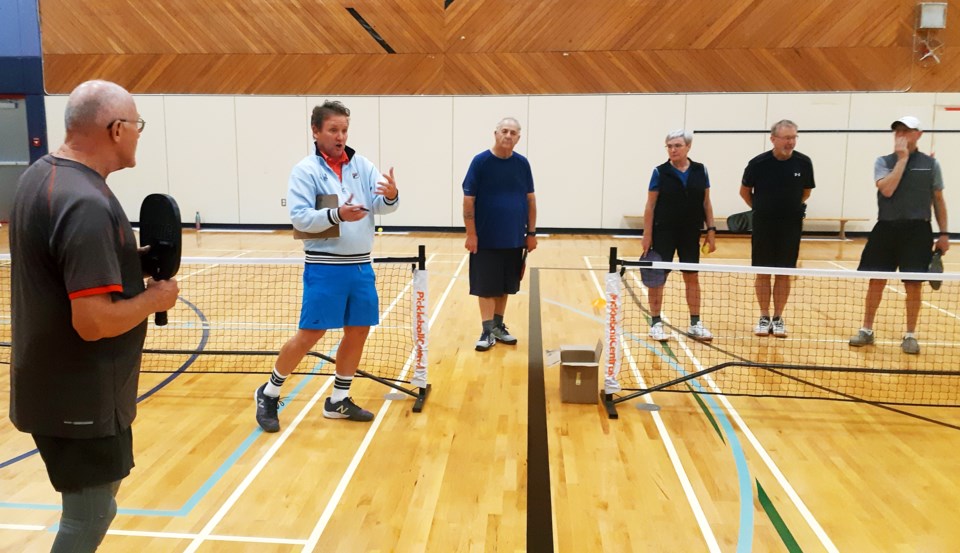Ralph Wood has his own theory on why pickleball is one of the fastest-growing participation sports in the world.
Not only is it lot of fun to play, but for beginners especially, it doesn’t take months of practice to figure out how to get the ball over the net.
“It’s an easy sport to learn and the thing is it doesn’t take long before you’re making the kind of shots that make you a hero,” said Wood, the pickleball coach for the Prince George Tennis and Pickleball Club.
“I taught tennis for years and it took me three months to get someone to rally and volley, here we can do it in 60 minutes. We can get people doing things you wouldn’t expect somebody would do in an hour. Someone told me that pickleball is much like any addiction, but it’s almost worse. It’s almost like crack cocaine when you’re taking it, you just want more, well this is the same thing, and it’s healthy.”
Wood was among three local pickleball enthusiasts who signed up two weekends ago for the Level 1 instructor’s course taught by Ontario-based coach Mark Rennison. Prince George was the first B.C. stop for Rennison in a Pickleball Canada/Tennis Canada initiative to launch a nationwide pickleball coaching education program accredited by the National Coaching Certification Program.
Fourteen aspiring instructors from Prince George, Williams Lake, Smithers, Terrace and Telkwa took part in Rennison’s one-day Level 1 course at the College of New Caledonia, Oct. 3. Wood, as well as Tracey Quickenden and Jim Allen are now nationally-certified to teach pickleball with the Prince George club.
“What they’re learning to do is to be able to introduce the sport of pickleball in a safe, fun and effective way where everyone who is participating has a great time,” said Rennison.
“Anyone who has been coaching, in many cases they’re volunteers or have been helping out, and in some cases there may be some people who have been paid for their coaching but there hasn’t been any standards up to this point. So what we’re doing is trying to give them some foundational skills so when they do introduce the sport to new people, the people participating will have a positive experience.”
The previous day, Rennison offered skills clinics for five different levels of ability and three one-hour Engage Sports Try It session at the Northern Sport Centre, the first of which drew 32 players, most of whom who had never played the game. It was a hectic night on the courts and Rennison wasn’t surprised the Ty It sessions drew a lot of interest. He knows why pickleball is growing in popularity.
“The barrier of entry is low, you can get equipment for not much money, the pickleball court is the size of a badminton court so you don’t need a lot of space and the ball doesn’t bounce much, so it’s relatively easy to start playing,” Rennison said.
“A lot of people who haven’t played a lot of sports before find they can have success quite quickly. It’s nice not having to chase ball too far over the court and it’s also really social. People make friends on the court and they find they have a new community they’re connected to. A lot of people make it their full-time sport.”
Rennison is based in Collingwood, Ont., where he works as a professional pickleball coach. After two decades a Tennis Professionals Association tennis coach operating his own business, Third Shot Sports, he switched to teaching pickleball in 2014, the year he first started playing the game. As the country’s head of education for pickleball he’s developing a team of course facilitators who can deliver the coaching course anywhere.
Invented in 1965, Canada has about 350,000 pickleball players. This year’s national championships attracted 789 players aged 10-80 in singles, doubles and mixed doubles events and offered open, skill- and age-based categories. Kingston, Ont., and Kelowna have hosted the national tournament and the Prince George club is considering a bid to play host to a regional event sanctioned by Racquetball Canada.
The Prince George Tennis and Pickleball Club where Wood plays, teaches and organizes club tournaments has nine outdoor pickleball courts adjacent Prince George Golf and Curling Club. On any given weekend and most weeknights during the warmer-weather months those courts come alive with the hollow sound of perforated plastic balls hitting off racquets and the laughter of the people playing the game. Wood estimates the city has at least 180 people who make pickleball a regular habit.
It’s an ideal activity to improve balance, agility, flexibility, reflexes and hand-eye co-ordination and because of the tight confines of the playing surface (20 feet wide, 44 feet deep) there’s not that much movement required to cover the court, so it’s not that hard on the joints. For many older tennis players who have developed hip, knee or shoulder problems, pickleball is natural progression, a game they can play well into the later years of life.
Now that it’s getting cold outside, pickleball is moving into gymnasiums around the city but you’ll still see the diehards playing outside on the club courts for the next few weeks until the snow flies.



